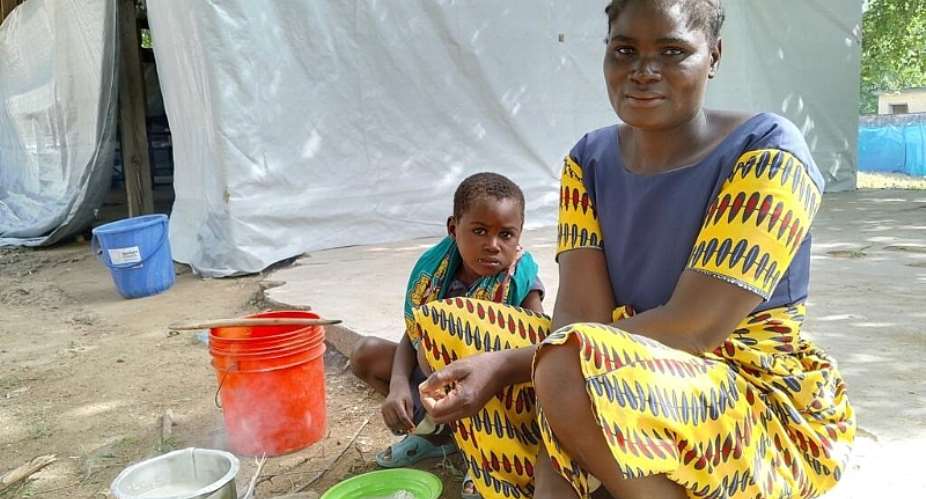Two years after Malawi experienced its deadliest ever cholera outbreak, a spate of sporadic infections is once again causing alarm. With 59,000 cases since 2022, Malawi has become the worst-hit country in southern Africa – where climate impacts and poor border controls are helping to fuel transmission of the illness.
At the Nyamithuthu health centre, in Malawi's southern-most district of Nsanje, Maria Khumbize is busy preparing porridge for her three children.
Her son, 18, and daughter, 2, are lying in bed hooked up to an intravenous drip. They have been in hospital for two days.
“It all started with fever and abdominal pain followed by diarrhea,” she says, pointing at her other daughter, aged six.
"She was the one who first caught the disease, but has since been discharged ... They have all tested positive for cholera.”
Khumbize suspects that a family member who visited them from neighbouring Mozambique brought the infection across the border.
Lack of clean water
The new surge in cases has been linked to a lack of clean water facilities, such as boreholes.
“According to our analysis, most people are coming from the shores of Shire river," says Thomson Madani, a medical assistant at the Nyamithuthu centre.
"We have cases some coming from Malawi, some coming from Mozambique, but they use the same river as their main source of water.
Meanwhile in Malawi's eastern Mulanje district, 93 cholera cases have been registered since January – with 10 percent of patients having recently travelled to Mozambique.
“We're doing surveillance making sure that we know if anyone has symptoms so that they can be identified," says Dr Stalin Zikanda, the director of health at Mulanje District Hospital.
"We are also educating people on cholera prevention and distributing chlorine to affected areas, and we're making sure that people are being taught about hygiene issues.”
Zikanda pointed to a shortage of cholera vaccines as one of the main challenges.
So far the hospital has been distributing the vaccine, which also acts as a treatment – but there are not enough doses for the entire district.
“That's why there haven't been any deaths in our cholera treatment unit," Zikanda adds.
Cross-border spread
About 188,000 cholera cases, including 3,000 related deaths, have been reported in eight countries in southern Africa since January 2023, the UN's humanitarian agency, OCHA, reported.
"A lack of sustainable access to water, sanitation, and hygiene services (WASH) continue to impede efforts to curb further spread and control of the disease," the agency said.
Malawi has reported 643 deaths so far this year.
“There is the potential threat of cross-border transmission as there are reports of severe cholera outbreaks going on in neighboring countries, notably, in Zambia,” Health Minister Khumbize Kandodo Chiponda warned.
While figures from Malawi's Health Ministry show a decline in the number of cases reported this season compared to last, the pockets of rising infections have been described as a wake-up call by campaigners.
“Cholera is still in our midst. It's high time that we started to intensify awareness raising and distribution of chlorine to communities that do not have reliable sources of water,” says George Jobe, the director of Malawi Health Equity Network, an NGO based in the capital, Lilongwe.
"We don't want to go back to the old situation where we lost many people."





 Two off-duty Police Officers shot by unknown gunmen on motorbike at Trasacco
Two off-duty Police Officers shot by unknown gunmen on motorbike at Trasacco
 Let’s fight monetisation of our democracy- Abu Kansangbata
Let’s fight monetisation of our democracy- Abu Kansangbata
 Prof Jane Naana Opoku-Agyeman attends central regional NDC meeting
Prof Jane Naana Opoku-Agyeman attends central regional NDC meeting
 Investigations into Cecilia Dapaah’s scandal not closed – AG
Investigations into Cecilia Dapaah’s scandal not closed – AG
 Austin Gamey criticizes gov't review of labour act
Austin Gamey criticizes gov't review of labour act
 Cecilia Abena Dapaah’s case incomplete without FBI’s finding – Edudzi Tameklo
Cecilia Abena Dapaah’s case incomplete without FBI’s finding – Edudzi Tameklo
 I’ll give ‘Kayayei’ workers tricycles if elected President – Dr Ankrah
I’ll give ‘Kayayei’ workers tricycles if elected President – Dr Ankrah
 Bawumia commissions first phase of Appiatse reconstruction project
Bawumia commissions first phase of Appiatse reconstruction project
 Nti fertilizer was not submitted for testing — Witness in Opuni’s trial confirms
Nti fertilizer was not submitted for testing — Witness in Opuni’s trial confirms
 Family of Ghanaian fishery observer demand answers months after his death
Family of Ghanaian fishery observer demand answers months after his death
